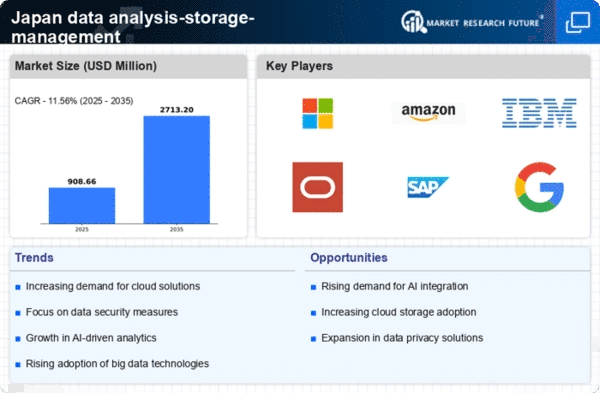Shift Towards Hybrid Cloud Solutions
The transition to hybrid cloud environments is becoming a prominent trend in Japan's data analysis-storage-management market. Organizations are recognizing the benefits of combining on-premises infrastructure with cloud services to optimize data storage and analysis. This hybrid approach allows for greater flexibility, scalability, and cost-effectiveness. Recent surveys indicate that approximately 60% of Japanese companies are planning to adopt hybrid cloud strategies within the next two years. This shift is expected to drive significant investments in data management technologies, as businesses seek to enhance their analytical capabilities while maintaining control over their data.
Rising Demand for Real-Time Analytics
The increasing need for real-time data insights is driving the data analysis-storage-management market in Japan. Businesses are recognizing the importance of timely decision-making, which necessitates advanced data storage solutions that can handle large volumes of data efficiently. According to recent statistics, the market for real-time analytics is projected to grow at a CAGR of 25% over the next five years. This growth is largely attributed to sectors such as finance and retail, where immediate data access can significantly enhance operational efficiency. As organizations strive to remain competitive, investments in data analysis-storage-management technologies are likely to escalate, further propelling market expansion.
Regulatory Compliance and Data Governance
In Japan, stringent regulations regarding data protection and privacy are influencing the data analysis-storage-management market. Companies are compelled to adopt robust data governance frameworks to ensure compliance with laws such as the Act on the Protection of Personal Information (APPI). This regulatory landscape is driving demand for sophisticated data management solutions that can facilitate secure data storage and analysis. The market is expected to witness a growth rate of approximately 18% as organizations prioritize compliance-related investments. Consequently, the focus on regulatory adherence is shaping the strategies of businesses, leading to increased adoption of advanced data analysis-storage-management tools.
Expansion of IoT and Big Data Technologies
The proliferation of Internet of Things (IoT) devices in Japan is significantly impacting the data analysis-storage-management market. With millions of devices generating vast amounts of data, there is a pressing need for effective storage and analysis solutions. The IoT market is anticipated to reach a valuation of $10 billion by 2026, which will likely drive the demand for data management technologies. As organizations seek to harness the potential of big data, investments in data analysis-storage-management systems are expected to rise. This trend indicates a shift towards more integrated solutions that can accommodate the complexities of IoT data.
Increased Focus on Business Intelligence Solutions
The growing emphasis on business intelligence (BI) tools in Japan is reshaping the data analysis-storage-management market. Organizations are increasingly leveraging BI solutions to extract actionable insights from their data, thereby enhancing strategic decision-making. The BI market is projected to grow by 20% annually, reflecting a strong demand for data analysis capabilities. This trend is prompting businesses to invest in comprehensive data storage and management systems that can support advanced analytics. As a result, the data analysis-storage-management market is likely to experience robust growth, driven by the need for effective BI solutions.
















